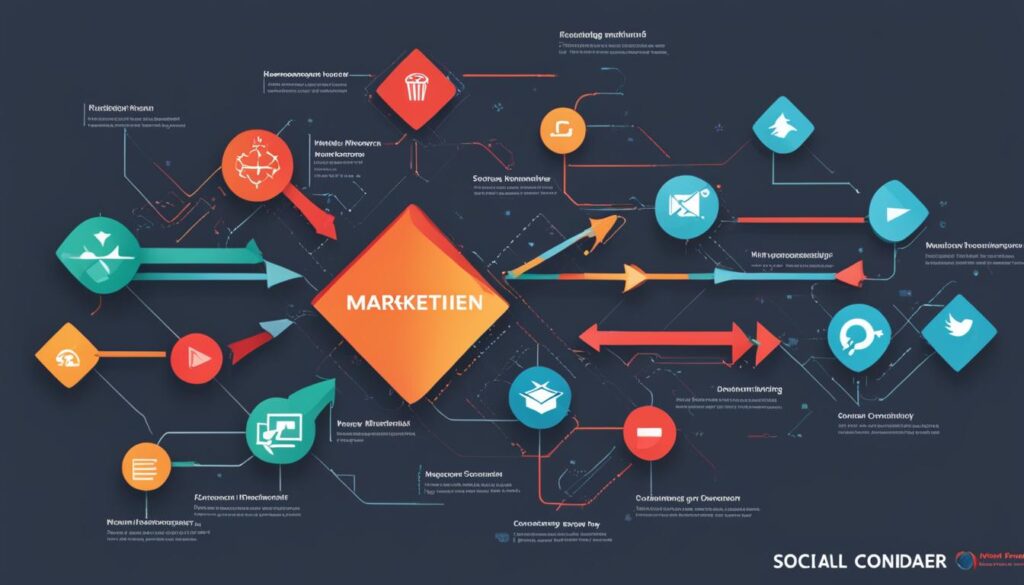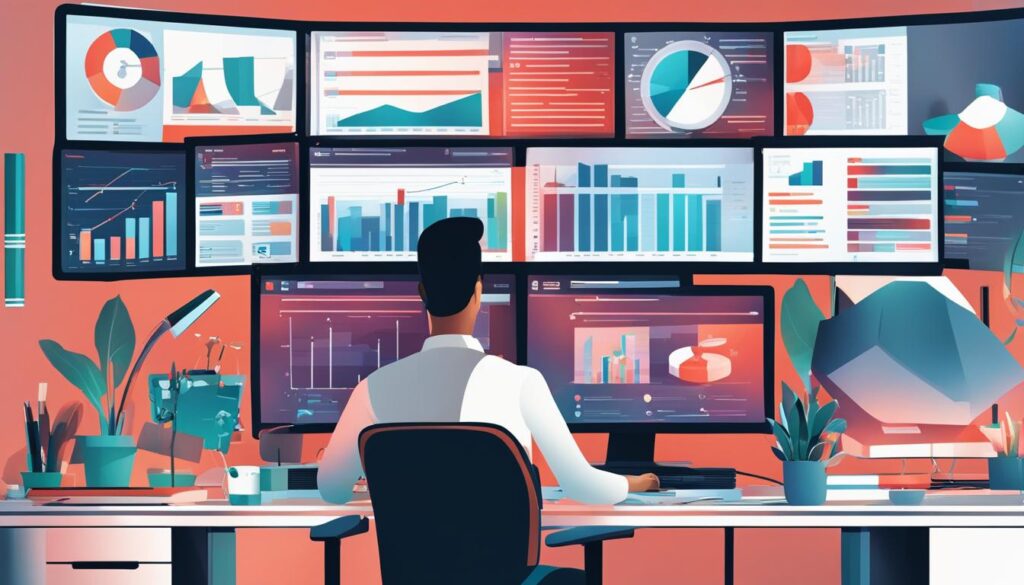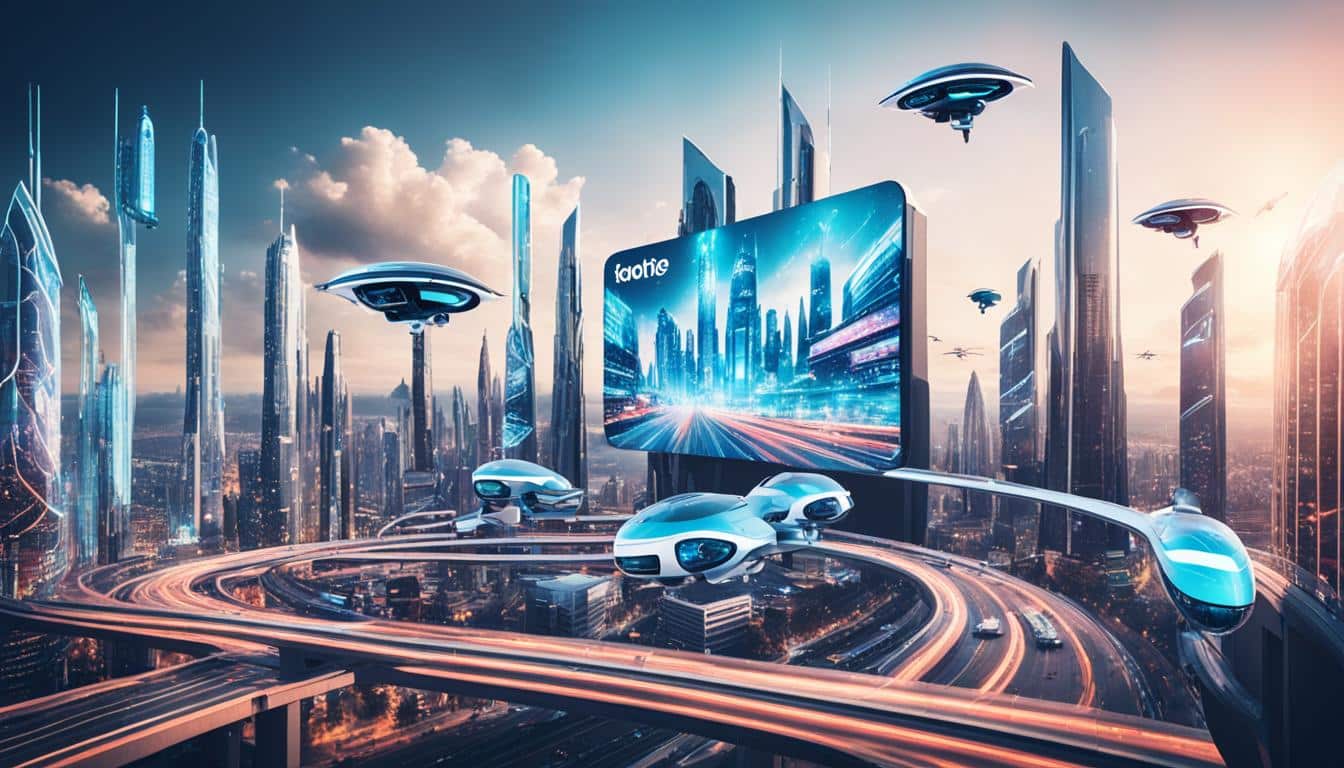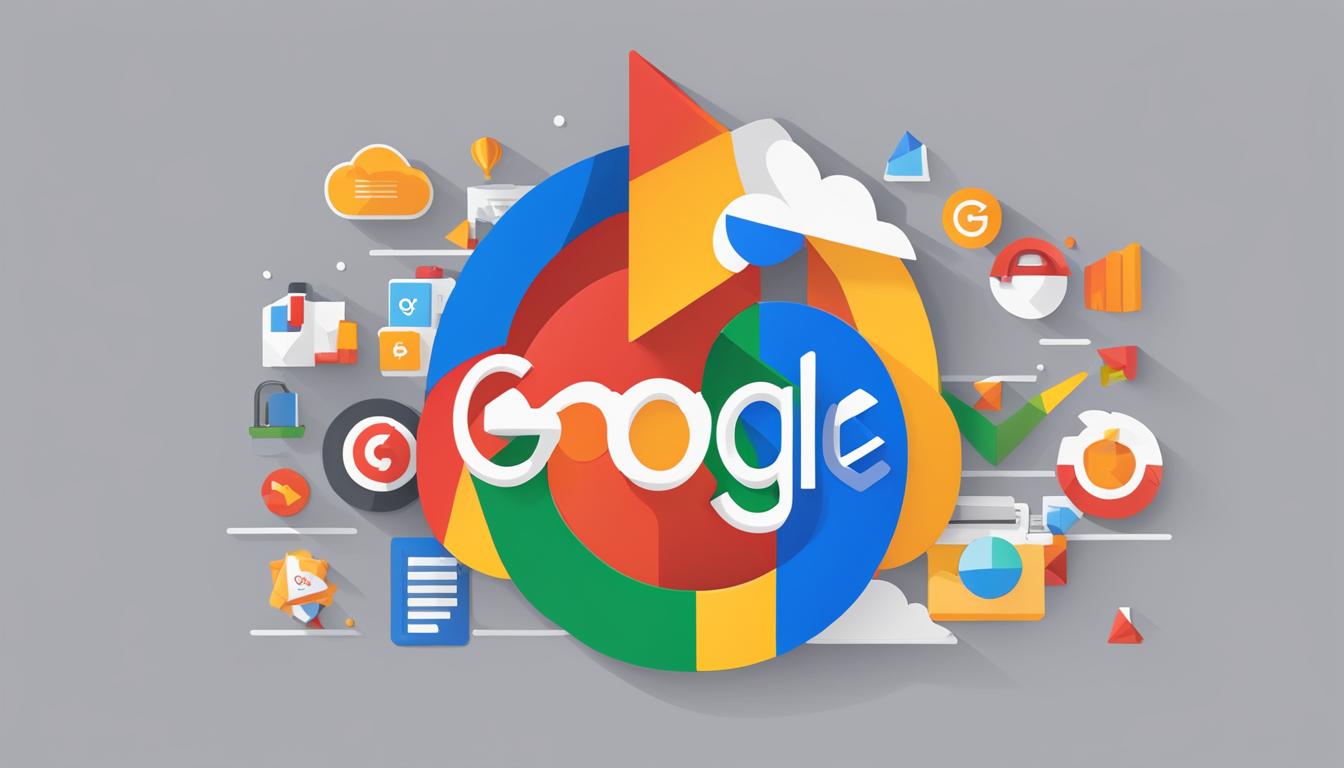A digital marketing coordinator plays a crucial role in boosting a brand’s success by implementing and managing effective marketing campaigns. They are responsible for planning, executing, and analyzing marketing efforts to increase brand visibility and drive engagement. With a strong understanding of market trends and demographics, a digital marketing coordinator plays a vital role in optimizing marketing activities and achieving marketing goals for the company. Their responsibilities encompass a wide range of duties, including coordinating marketing campaigns, analyzing sales data, and working closely with marketing teams.
Key Takeaways:
- A digital marketing coordinator is responsible for implementing and managing effective marketing campaigns.
- They play a crucial role in increasing brand visibility and driving engagement.
- Understanding market trends and demographics is essential for optimizing marketing activities.
- Coordinating marketing campaigns and analyzing sales data are part of their responsibilities.
- Collaboration with marketing teams is necessary for achieving marketing goals.
Types of Marketing Coordinators
A digital marketing coordinator is one of several types of marketing coordinators with specific job descriptions tailored to different areas of expertise. Other types of marketing coordinators include content marketing coordinators, product account coordinators, influencer marketing coordinators, and social media marketing coordinators.
Content marketing coordinators focus on managing content creation for various platforms such as blogs and social media. They are responsible for developing engaging and informative content that aligns with the brand’s messaging and target audience.
Product account coordinators support sales teams in improving customer relationships and the buying process. They work closely with key accounts, ensuring that their needs are met and facilitating smooth communication between the sales team and the clients.
Influencer marketing coordinators maintain and manage relationships with influencers to enhance brand recognition and reach. They identify suitable influencers, negotiate collaborations, and track the performance of influencer marketing campaigns.
Social media marketing coordinators are responsible for creating successful social media campaigns to grow a brand’s audience and engagement. They develop strategies, curate content, manage social media platforms, and analyze metrics to optimize social media performance.
| Type | Job Description |
|---|---|
| Content Marketing Coordinator | Manages content creation for various platforms, such as blogs and social media |
| Product Account Coordinator | Supports sales teams in improving customer relationships and the buying process |
| Influencer Marketing Coordinator | Maintains and manages relationships with influencers to enhance brand recognition and reach |
| Social Media Marketing Coordinator | Creates successful social media campaigns to grow a brand’s audience and engagement |
Skills Required for a Marketing Coordinator
A marketing coordinator needs a diverse set of skills to excel in their role. They require both technical skills and workplace skills to effectively execute marketing campaigns and achieve desired outcomes.
Technical skills play a crucial role in the day-to-day activities of a marketing coordinator. These skills include analyzing sales data, conducting market research, creating promotional materials, carrying out marketing campaigns, evaluating market trends, identifying target audiences, and utilizing web tools like HTML, CSS, and JavaScript. Proficiency in these technical skills allows marketing coordinators to gather insights, optimize campaigns, and drive results.
In addition to technical skills, workplace skills are equally important for marketing coordinators. Communication skills are vital for collaborating with team members, stakeholders, and external partners. Organization skills help in managing multiple projects, prioritizing tasks, and meeting deadlines. Creativity is essential for developing engaging marketing content and innovative campaigns. Analytical thinking enables marketing coordinators to analyze data, identify trends, and make data-driven decisions. Lastly, teamwork and ambition facilitate effective collaboration and a drive for achieving marketing goals.
Table: Skills Required for a Marketing Coordinator
| Technical Skills | Workplace Skills |
|---|---|
| Analyzing sales data | Communication |
| Conducting market research | Organization |
| Creating promotional materials | Creativity |
| Carrying out marketing campaigns | Analytical thinking |
| Evaluating market trends | Teamwork |
| Identifying target audiences | Ambition |
| Utilizing web tools (HTML, CSS, JavaScript) |
These combined technical and workplace skills enable marketing coordinators to effectively execute marketing campaigns, drive engagement, and contribute to the success of the overall marketing strategy.
Salary and Compensation for Marketing Coordinators
A crucial aspect of any job is the salary and compensation package it offers. Marketing coordinators are no exception, and understanding the average salary and additional pay can help professionals make informed decisions about their careers. According to Glassdoor, the average salary for marketing coordinators in the US is $51,851 per year. This figure includes base pay as well as additional compensation such as commissions, bonuses, tips, and profit sharing.
When it comes to additional pay, marketing coordinators may benefit from commissions, which are monetary incentives based on sales performance. Bonuses, on the other hand, are often given for exceptional achievements or meeting specific targets. Tips, although less common in this profession, may also be part of the compensation package. Additionally, profit sharing can provide a portion of the company’s profits to employees, further enhancing their overall salary.
It’s important to note that the salary range for marketing coordinators can vary depending on factors such as experience level, company size, and industry. Marketing coordinators with one to three years of experience typically earn around $50,642 per year, while those with seven to nine years of experience can expect to earn approximately $58,619 per year. This highlights the potential for growth and increased earning potential as marketing coordinators gain more experience in their field.
| Salary Range (Per Year) | Average | Additional Pay |
|---|---|---|
| $50,642 – $58,619 | $51,851 | Commissions, Bonuses, Tips, Profit Sharing |
How to Become a Marketing Coordinator
Becoming a marketing coordinator requires a combination of education, qualifications, and practical experience. The following steps outline the path to becoming a marketing coordinator:
- Earn a Bachelor’s Degree in Marketing or a related field. A solid foundation in marketing principles, consumer behavior, and market research is essential.
- Gain Marketing Experience. Internships, entry-level marketing roles, or freelance positions can provide valuable hands-on experience and help develop practical skills.
- Develop Technical Skills. Familiarize yourself with various digital marketing tools and techniques, such as SEO, analytics, social media management, and email marketing. Proficiency in web tools like HTML, CSS, and JavaScript is also beneficial.
- Continuously Learn and Stay Updated. Stay updated with the latest marketing trends, industry best practices, and emerging technologies. Attend workshops, seminars, and online courses to enhance your skills and knowledge.
By following these steps, individuals can build a strong foundation in marketing and acquire the necessary qualifications and skills to pursue a career as a marketing coordinator.
Qualifications for a Marketing Coordinator
The qualifications required to become a marketing coordinator typically include:
- A Bachelor’s Degree in Marketing or a related field
- Relevant marketing experience, either through internships, entry-level positions, or freelance work
- Strong analytical and problem-solving skills
- Excellent communication and interpersonal skills
- Proficiency in digital marketing tools and techniques
Employers may also value additional certifications or specialized training in areas like social media marketing, content creation, or data analytics.
Overall, a combination of education, experience, and technical skills is crucial for aspiring marketing coordinators to stand out in the competitive job market and succeed in their roles.
| Qualification | Details |
|---|---|
| Bachelor’s Degree | A degree in Marketing or a related field provides a solid foundation in marketing principles and strategies. |
| Marketing Experience | Relevant experience through internships or entry-level roles helps develop practical skills and industry knowledge. |
| Technical Skills | Proficiency in digital marketing tools and techniques, such as SEO, analytics, and social media management. |
| Analytical Skills | Strong analytical and problem-solving abilities to evaluate marketing campaigns and make data-driven decisions. |
| Communication Skills | Excellent communication and interpersonal skills to collaborate with team members and effectively convey marketing messages. |
Marketing Coordinator Career Path and Advancement Opportunities

Marketing coordinators have a wide range of career advancement opportunities within the marketing field. With the right skills and experience, they can progress from their coordinator role to management positions such as marketing manager, social media manager, or advertising manager. As they continue to gain expertise and experience, marketing coordinators can further advance to positions of director, vice president, and even chief officer/executive, where they oversee the entire marketing function of a company.
Advancement opportunities for marketing coordinators often depend on factors such as performance, industry knowledge, and the ability to demonstrate leadership and strategic thinking. It is also worth noting that staying with the same company may increase the chances of advancement, as employers often prefer to promote from within. However, there are also ample opportunities for growth in other organizations, especially for marketing coordinators who have proven themselves to be valuable assets.
Transitioning from a marketing coordinator role to a management position typically involves taking on greater responsibilities, leading larger teams, and being involved in strategic decision-making processes. Marketing coordinators seeking advancement must develop strong leadership skills, demonstrate the ability to drive results, and stay up-to-date with industry trends and best practices. By doing so, they can position themselves for career growth and open doors to higher-level roles within the marketing field.
Advancement Opportunities in Marketing Coordinators Career Path:
- Marketing Manager
- Social Media Manager
- Advertising Manager
- Director of Marketing
- Vice President of Marketing
- Chief Marketing Officer/Executive
| Job Title | Average Salary |
|---|---|
| Marketing Manager | $73,014 per year |
| Social Media Manager | $58,643 per year |
| Advertising Manager | $68,229 per year |
| Director of Marketing | $106,363 per year |
| Vice President of Marketing | $148,531 per year |
| Chief Marketing Officer/Executive | $178,743 per year |
“With the right skills and experience, marketing coordinators can progress to become marketing managers, social media managers, or advertising managers. Further advancement can lead to positions such as director of marketing, vice president of marketing, and even chief marketing officer/executive, where they oversee the entire marketing function of a company.”
The Role of Digital Marketing in the Marketing Coordinator Position

A digital marketing coordinator plays a vital role in driving a brand’s success through strategic online marketing efforts. With the growing significance of digital platforms, internet marketing has become a key component of any comprehensive marketing strategy. Digital marketing encompasses various channels such as social media marketing, pay-per-click (PPC) advertising, and email marketing, which are essential for brand visibility and customer engagement in the digital landscape.
Online marketing allows marketing coordinators to reach a wider audience by leveraging the power of social media platforms like Facebook, Instagram, and Twitter. Through targeted social media marketing campaigns, brands can connect with their target audience and promote their products or services effectively. Digital marketing also offers the ability to track and analyze campaign performance in real-time, allowing marketing coordinators to make data-driven decisions and optimize marketing efforts accordingly.
PPC advertising is another crucial online marketing channel that helps marketing coordinators drive traffic and generate leads. By creating targeted ads and bidding on relevant keywords, brands can appear at the top of search engine results pages and reach potential customers actively searching for their products or services. Email marketing is yet another powerful tool that digital marketing coordinators utilize to establish direct communication with customers, cultivate brand loyalty, and drive revenue through personalized promotions and offers.
| Digital Marketing Channels | Benefits |
|---|---|
| Social Media Marketing | Connect with target audience, increase brand visibility, drive engagement |
| PPC Advertising | Drive targeted traffic, generate leads, increase conversions |
| Email Marketing | Establish direct communication, build brand loyalty, drive revenue |
In conclusion, digital marketing plays a crucial role in the marketing coordinator position by facilitating brand success through effective online marketing strategies. The ability to leverage various digital marketing channels, such as social media marketing, PPC advertising, and email marketing, allows marketing coordinators to optimize their marketing efforts, reach their target audience, and achieve marketing goals. With the ever-growing importance of digital platforms, a strong understanding of online marketing techniques is essential for marketing coordinators to thrive in today’s digital age.
Skills and Tools for Digital Marketing Coordinators

A digital marketing coordinator requires a diverse set of skills and tools to effectively execute their responsibilities. These skills include:
- Analytical skills: Digital marketing coordinators must possess strong analytical skills to analyze campaign performance, track key metrics, and make data-driven decisions to optimize marketing efforts.
- SEO/SEM knowledge: Understanding search engine optimization (SEO) and search engine marketing (SEM) techniques is crucial for digital marketing coordinators to optimize digital campaigns and improve organic search rankings.
- Proficiency in ad server tools: Digital marketing coordinators should be familiar with ad server tools to effectively manage ad placement and monitor the performance of online advertising.
- Web tools expertise: Proficiency in web tools such as HTML, CSS, and JavaScript allows digital marketing coordinators to create and optimize digital content, landing pages, and websites.
- Project management skills: Strong project management skills enable digital marketing coordinators to effectively manage multiple campaigns, meet deadlines, and ensure the timely delivery of marketing deliverables.
Having these skills equips digital marketing coordinators to execute their responsibilities with efficiency and effectiveness, facilitating the achievement of marketing goals and driving brand success.
Table: Comparison of Digital Marketing Coordinator Skills and Tools
| Skills/Tools | Description |
|---|---|
| Analytical skills | Ability to analyze campaign performance, track metrics, and make data-driven decisions. |
| SEO/SEM knowledge | Understanding of search engine optimization and search engine marketing techniques. |
| Ad server tools | Familiarity with tools to manage ad placement and monitor online advertising performance. |
| Web tools expertise | Proficiency in HTML, CSS, and JavaScript for content creation and website optimization. |
| Project management skills | Ability to manage multiple campaigns, meet deadlines, and deliver marketing materials on time. |
By leveraging these skills and utilizing the right tools, digital marketing coordinators are well-equipped to enhance brand visibility, engage target audiences, and drive successful digital marketing campaigns.
Training and Education for Digital Marketing Coordinators

A career as a digital marketing coordinator requires a strong foundation of knowledge and skills. While a bachelor’s degree in marketing or a related field is typically required, there are additional resources and opportunities available to enhance your expertise in digital marketing. Here are some options to consider:
Marketing Coordinator Job Description Templates
Start by familiarizing yourself with marketing coordinator job description templates. These templates provide valuable insights into the key responsibilities and requirements of the role. They can serve as a guide for understanding the skills and qualifications needed to succeed as a digital marketing coordinator.
Digital Marketing Programs
Enrolling in a digital marketing program can provide a comprehensive understanding of various digital marketing strategies and tools. These programs often cover topics such as SEO, content marketing, social media marketing, email marketing, and analytics. Completing a digital marketing program can help you develop specialized skills that are highly sought after in the industry.
Specialized Courses and Certifications
Consider taking specialized courses or obtaining certifications in specific areas of digital marketing. These courses and certifications can provide in-depth knowledge and practical skills in areas such as social media marketing, search engine optimization, Google Analytics, and digital advertising platforms. Adding these credentials to your resume can demonstrate your commitment to continuous learning and professional development.
Marketing Skills Development
Lastly, never underestimate the power of self-learning. Stay updated with the latest trends and best practices in digital marketing by reading industry blogs, attending webinars, and participating in online forums. Invest time in honing your marketing skills, experimenting with different strategies, and staying ahead of the curve.
By combining formal education with specialized training and self-learning, you can build a strong skill set and establish yourself as a competent digital marketing coordinator. Remember to continually adapt and evolve your skills as the digital marketing landscape continues to evolve.
Digital Marketing Coordinator Job Responsibilities
A digital marketing coordinator plays a critical role in developing and implementing effective marketing campaigns to boost a brand’s success. Their job responsibilities encompass various key areas, including marketing campaigns, content creation, social media management, SEO, and email marketing.
Marketing Campaigns
One of the main responsibilities of a digital marketing coordinator is to plan and execute marketing campaigns across different channels. This involves developing strategies, creating compelling content, and coordinating with various teams to ensure campaign success. They are responsible for defining campaign objectives, identifying target audiences, and implementing strategies to drive engagement and conversions.
Content Creation
A digital marketing coordinator is also involved in content creation for various marketing initiatives. This includes writing engaging blog posts, creating captivating social media content, and developing email marketing campaigns. They ensure that the content aligns with the brand’s voice and effectively communicates key messages to the target audience.
Social Media Management
Social media plays a vital role in digital marketing, and a digital marketing coordinator is responsible for managing social media accounts and implementing effective social media strategies. This involves creating and scheduling posts, engaging with followers, analyzing social media metrics, and staying up-to-date with industry trends to optimize social media presence and drive brand awareness.
SEO and Email Marketing
A digital marketing coordinator is also responsible for optimizing websites for search engines (SEO) and implementing email marketing campaigns. They ensure that websites are optimized with relevant keywords, meta tags, and quality content to improve search engine rankings. Additionally, they create and manage email marketing campaigns to engage with customers and nurture leads, leveraging email automation tools and analyzing campaign performance to drive better results.
| Responsibilities | Details |
|---|---|
| Marketing Campaigns | Plan, execute, and analyze marketing campaigns across different channels to drive engagement and conversions. |
| Content Creation | Create compelling content for blog posts, social media, and email marketing campaigns that align with the brand’s voice and key messages. |
| Social Media Management | Manage social media accounts, create engaging posts, analyze metrics, and stay up-to-date with industry trends to optimize social media presence. |
| SEO and Email Marketing | Optimize websites for search engines, implement email marketing campaigns, and analyze performance to improve search engine rankings and drive customer engagement. |
Conclusion
A digital marketing coordinator is a vital asset in achieving brand success through effective marketing strategies and efforts. With their expertise and skills in digital marketing, they play a crucial role in optimizing marketing activities and driving results for the company. By utilizing various online marketing channels, such as social media, PPC advertising, and email marketing, digital marketing coordinators enhance brand awareness and engage target audiences.
Their responsibilities encompass planning, executing, and analyzing marketing campaigns to increase brand visibility and drive engagement. With a strong understanding of market trends and digital platforms, digital marketing coordinators contribute to the overall success of the marketing strategy and efforts.
By integrating their technical skills, such as analytics, SEO, and web tools, with their creativity and communication abilities, digital marketing coordinators effectively tailor strategies to specific target audiences. Through their commitment to staying up-to-date with the latest digital marketing trends, they continually optimize marketing activities and achieve marketing goals.
In conclusion, a digital marketing coordinator plays a crucial role in the success of a brand’s marketing strategy and efforts. Their skills, expertise, and understanding of digital platforms contribute to the overall success of marketing campaigns, ensuring brand visibility and engagement, and ultimately driving the desired results for the company.
Also Refer : Effective Strategies For Law Firm Digital Marketing Success
FAQs
Q: What are the duties and responsibilities of a digital marketing coordinator?
A: A digital marketing coordinator job description is responsible for creating and managing digital marketing campaigns, developing and implementing digital marketing strategies, organizing and coordinating digital marketing efforts, and analyzing and reporting presentation on the success of marketing campaigns.
Q: What skills are required to be a successful digital marketing coordinator?
A: Successful digital marketing coordinators need to have strong communication and writing skills, be proficient in digital marketing tools and platforms like Google AdWords and Google Analytics, and have a solid understanding of different digital marketing tactics and strategies.
Q: What is the job description for a digital marketing coordinator?
A: The job description for a digital marketing coordinator typically includes managing all digital marketing efforts, coordinating with different departments and vendors, creating and managing digital marketing calendars and timelines, tracking campaign performance, and optimizing marketing strategies based on data analysis.
Q: What qualifications are necessary to become a digital marketing coordinator?
A: To become a digital marketing coordinator, candidates often need a bachelor’s degree in marketing or a related field, and some employers may prefer candidates with a master’s degree. Additionally, having certifications in digital marketing or related fields can be beneficial.
Q: How does a digital marketing coordinator contribute to a company’s success?
A: A digital marketing coordinator helps boost a brand’s success by creating compelling online content, managing various social media platforms, conducting research to identify target audiences, creating and executing advertising campaigns, and constantly optimizing digital marketing strategies to generate leads and conversions.
Q: How does a digital marketing coordinator work with other departments and teams within an organization?
A: A digital marketing coordinator collaborates with various departments and teams within an organization to customize digital marketing strategies to meet specific objectives, gather input and content from different areas of the organization, and align digital marketing efforts with the overall goals of the business.
Q: What are the typical projects a digital marketing coordinator would be involved in?
A: A digital marketing coordinator would typically be involved in projects such as launching new online campaigns, optimizing the organization’s online presence, compiling and analyzing data from different digital marketing activities, and working on partnerships with external vendors or marketing agencies.
Q: How does a digital marketing coordinator recruit and hire new talent for the marketing team?
A: A digital marketing coordinator is involved in the recruitment process by working with hiring managers to identify suitable candidates, coordinating interviews and assessments, and evaluating candidates based on their skills and experience in digital marketing.
Q: How does a digital marketing coordinator track the success of marketing campaigns?
A: Digital marketing coordinators use tools like Google Analytics to track website traffic and user behavior, conduct A/B testing for different marketing tactics, compile and analyze data to measure the performance of advertising campaigns, and use the information to optimize future marketing efforts.
Q: What are the main differences between a digital marketing coordinator and an ecommerce marketing coordinator?
A: While digital marketing coordinators focus on the overall digital marketing activities of an organization, ecommerce marketing coordinators specifically concentrate on marketing efforts related to online sales and specific aspects of digital marketing for ecommerce platforms.













